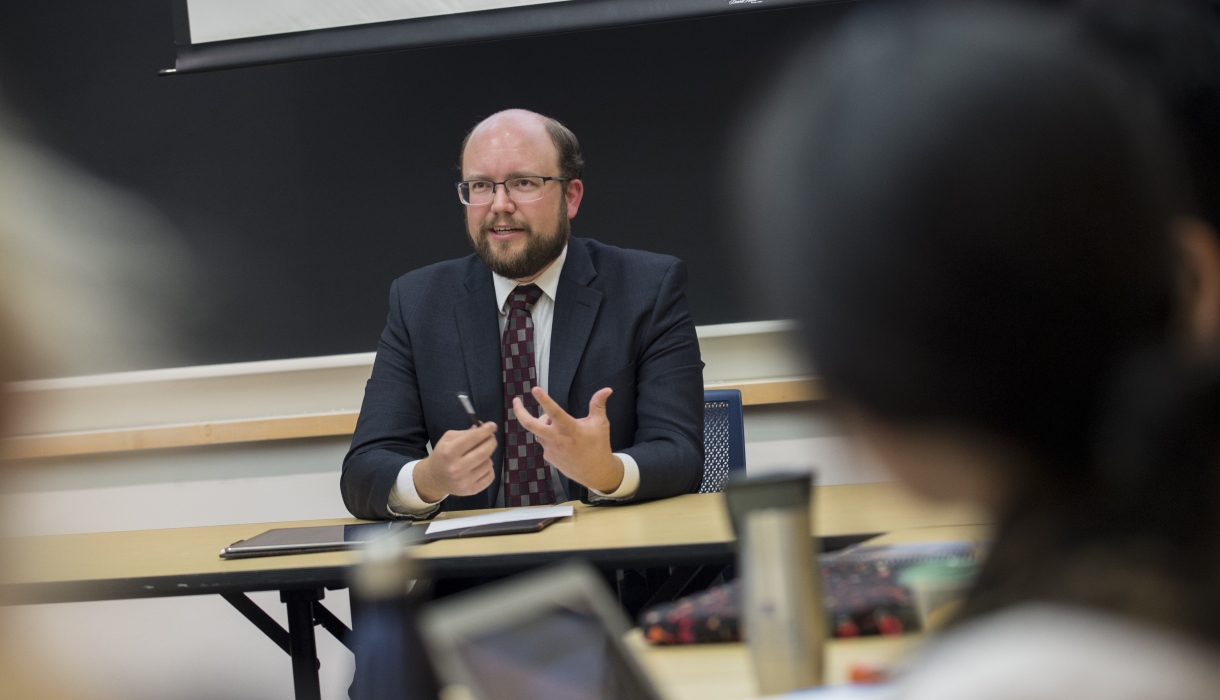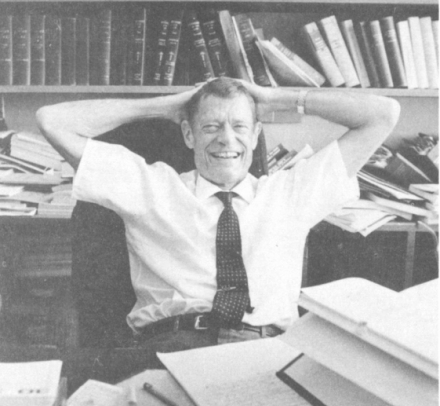Professor Kellen Funk Awarded 2023 Willis L.M. Reese Prize for Excellence in Teaching
Students praise Funk for his enthusiasm, intellect, and compassion. He will receive the honor, which is awarded annually by the Columbia Law graduating class, and speak at graduation on May 15.

Federal Courts is known as a very tough course, but at Columbia Law School, it’s taught by a professor known for his tenderness: Kellen R. Funk.
In course evaluations, students describe Funk, who joined the faculty in 2018, as “supportive,” “accessible,” “one of the gems of Columbia Law School,” and a “‘professional’ professor in every sense of the word.” Another student wrote: “You will be hard-pressed to find someone more interested in your well-being and education.”
“Fed Courts deserves its reputation,” wrote another student. “But I can’t imagine anyone as a better guide through the doctrine.” Another praised his course as “masterfully done. . . . Professor Funk approaches the subject of federal courts with an inspiring combination of humility and brilliance.”
Funk is also humble. He says he was genuinely surprised when Gillian Lester, Dean and Lucy G. Moses Professor of Law, told him that the Class of 2023 voted to award him the annual Willis L.M. Reese Prize for Excellence in Teaching. “I was blown away by the generosity of my students,” he says.
An Empathetic Educator
Funk’s popularity as a teacher rests on his passion for the subjects he teaches and his empathy for students. “It can be a real asset, when trying to help them through the fog and haze of Federal Courts, to have a vivid memory of when this subject was foggy and hazy for yourself,” he says. “I am still curious, puzzled, and troubled by aspects of what I teach, and I enjoy sharing that curiosity with my students.”
In addition to Federal Courts, Funk also teaches American Legal History, Civil Procedure, Introduction to American Law, and a popular seminar, The American Bail System.
As a legal historian with a Ph.D. in American history from Princeton and a J.D. from Yale Law School, Funk is an ideal guide to Federal Courts. “It’s a very old body of doctrine, and often, you have to go back over centuries of jurisprudence to figure out how the doctrine works today,” he says. One student noted how Funk “smartly situates doctrine in political and historical contexts.”
Funk encourages debate about the legitimacy of federal courts in his classroom. “We are probably reaching higher levels of skepticism about the courts and their role in American society than we have seen, not ever, but for a very long time indeed,” he says. “And that skepticism, I welcome in class. I think it is productive for us to be asking the hardest questions we can about what these courts are, what they should be doing, and what they’re capable of doing.”
Federal Courts is considered essential for law students who plan to clerk for a federal judge. “My own clerkship experience informs my teaching at every point,” says Funk, who clerked for Judge Lee H. Rosenthal of the U.S. District Court for the Southern District of Texas and for Stephen F. Williams of the U.S. Court of Appeals for the D.C. Circuit. “I learned about what makes an effective advocate and what makes an ineffective advocate, which are both useful for clerks and graduating law students to learn.”
Funk says the most important lesson from clerking that he shares with students is how court-ordered remedies work in the real world. “The course has to prepare students, especially if they are going into clerkships immediately after law school, to think about where cases end and how enforcement actually hits the ground, how the judicial decree goes out in the world and makes a difference,” he says.
A Perennial Student
Teaching and scholarship go hand in hand for Funk. “It’s really the same—the joy of figuring out puzzles, the quest for resolving confusions—but teaching is in a community, and scholarship is often a solitary occupation,” he says. Funk’s primary scholarly pursuit at the moment is writing a book on the history of the American bail system from the country’s founding to the present. He incorporates two other academic interests into that project: the use of digital text analysis to learn about legal history and the interplay of law and religion outside a First Amendment framework.
Like his Federal Courts course, Funk’s American Bail System seminar—which he says is a “grim pleasure” to teach—also focuses on real-world outcomes. “The bail decision is going to determine whether a defendant is free or incarcerated during trial, which is probably the most consequential choice that gets made in the entire criminal process,” he says, adding that it is a decision upon which guilt, sentence, and so many other outcomes are going to depend. Bail decisions, he says, can affect whether someone has ready access to counsel, records, and subpoenas, and even whether they have the ability to mount a defense.
Students find the bail seminar challenging and enlightening. One student commented in a course evaluation: “He asks sharp questions that really get us to think deeply about the legal, social, and ethical issues surrounding bail.”
Funk credits his mother with being his first—and best—teacher. “She was always willing to entertain the toughest questions that little children can come to metaphysically, and take those questions seriously and patiently, and to pursue whatever puzzles I was interested in from an early age,” he says. “She had an enormous impact as a model for how to mentor someone. . . . The best teachers are not necessarily those that have made their students a copy of themselves, but those who have worked hard to make their students the best version of their students’ selves.”
Clearly, she taught him well. As a Federal Courts student wrote: “This is a class about stuff that often, on the surface, may not be the most exciting material. But if there is anyone on this planet that can make it exciting, it’s Kellen Funk.”
